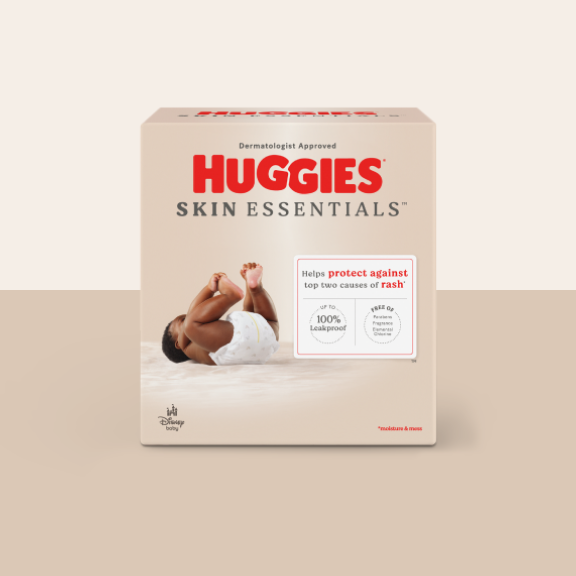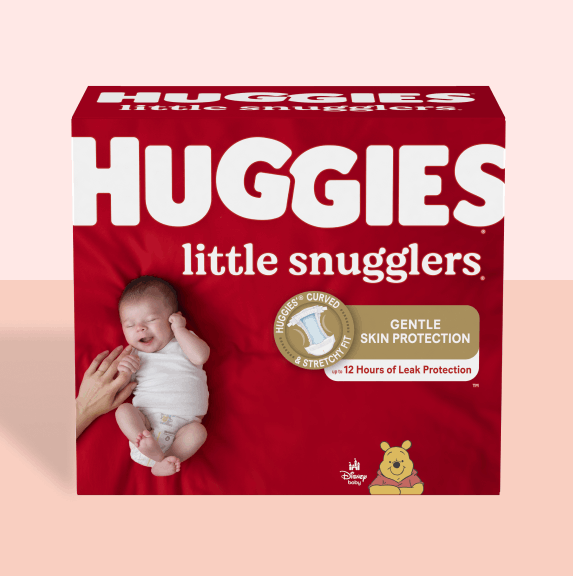Huggies diaper size and weight chart guide
Whether you’re welcoming a new baby or finding the right fit for your toddler, diaper sizing can be tricky. Case in point: diapers come in different sizes based on your baby's weight, not their age. Whether it's diaper sizes, sizing charts or weight specifics, we've got your guide to a snug fit for every stage!
The right diaper size and number of diapers for your baby
Ensure you have the right diaper size for your baby by considering their weight and appearance; sizes range from preemie to 7. If you're unsure of your baby’s weight, try this trick: step on the scale alone, then with your baby to reveal their weight. Once you have the correct size, use the chart to determine how many diapers your baby will need in a given day, helping you plan ahead and stay organized.
|
DIAPER SIZE |
WEIGHT |
AVERAGE NUMBER OF DIAPERS PER DAY |
APPROX. HOW LONG YOU’LL USE THEM |
|---|---|---|---|
|
Preemie 
|
Up to 6 lbs. |
As needed |
Varies |
|
Newborn 
|
Up to 10 lbs. |
8 per day |
1 month |

|
8-14 lbs. |
6 per day |
1.5 month |

|
12-18 lbs. |
5 per day |
3 months |

|
16-28 lbs. |
5 per day |
7 month |

|
22-37 lbs. |
4 per day |
8 months |

|
>27 lbs. |
4 per day |
6 month |

|
>35 lbs. |
4 per day |
3.5 months |

|
>41 lbs. |
Varies |
Varies |
|
DIAPER SIZE |
WEIGHT (Avg. number of diapers per day; Approx. how long you’ll use them) |
|---|---|
|
Preemie 
|
Up to 6 lbs. (As needed; Varies) |
|
Newborn 
|
Up to 10 lbs. (8 per day for 1 month) |

|
8-14 lbs. (6 per day for 1.5 months) |

|
12-18 lbs. (5 per day for 3 months) |

|
16-28 lbs. (5 per day for 7 months) |

|
22-37 lbs. (4 per day for 8 months) |

|
>27 lbs. (4 per day for 6 months) |

|
>35 lbs. (4 per day for 4.5 months) |

|
>41 lbs. (Varies; Varies) |
Getting the right fit
Using the right-sized diaper is super important to help prevent blowouts and leaks, which can happen when a diaper is too small or too large. Consider getting a diaper with a blowout blocker, which can also help to prevent blowouts. Having the diaper fit well is also important to help manage the top two causes of diaper rash: moisture and mess. A diaper that is too tight can hold moisture too close to the skin, resulting in irritation.
Diapers should:

Fit snuggly below the belly button

Cover the baby’s bottom completely

Fit snuggly around the legs without being too tight
Run your finger along the legs to flare out the diaper. This creates a comfortable fit and protects against leaks and blowouts.

Have about a two-finger gap between your baby’s skin and the diaper

Never leave red marks on their skin

Some diapers have sizing indicator images in the front of the diaper to show when it’s time to size up again
Once that image beneath the fastened tabs starts to show, it’s time to size up.
Remember, this is all a general guide — you might have a long and lean baby that needs to size down in diapers or a baby who needs to go up one size to be more comfortable.
When to size up in diapers
There are a few signs to know when your baby needs to change diaper sizes:
- The diaper doesn’t fit snuggly around the belly button and might be much lower.
- The legs are too tight and leave red marks on your baby.
- The diaper doesn’t cover baby’s entire bottom.
- You cannot fit two fingers length-wise in between your child’s stomach and the diaper.
- The color beneath the fastener strips is starting to show.
- There are red marks anywhere on your baby.
- You’ve had an increase in blowouts or leaks.








